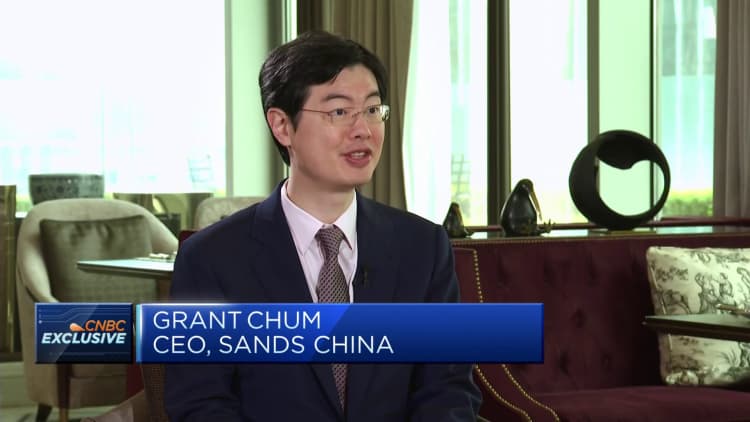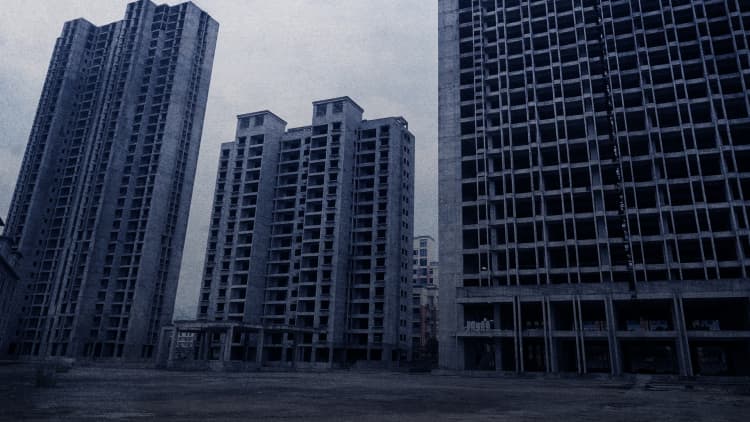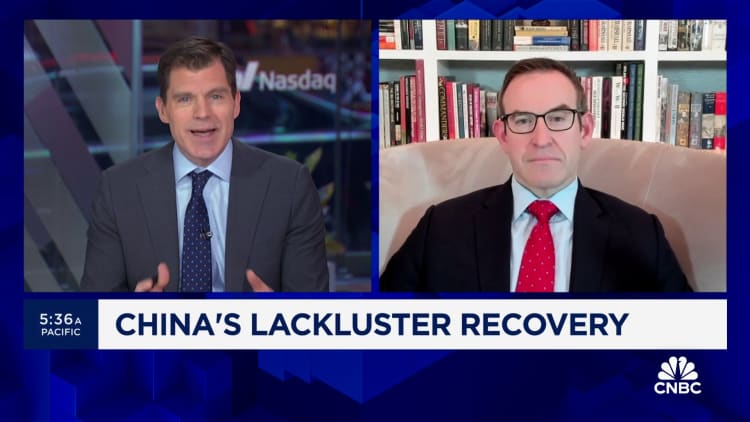A
Chinese
flag
flutters
on
top
of
the
Great
Hall
of
the
People
ahead
of
the
opening
ceremony
of
the
Belt
and
Road
Forum
(BRF),
to
mark
10th
anniversary
of
the
Belt
and
Road
Initiative,
in
Beijing,
China
October
18,
2023.
Edgar
Su
|
Reuters
BEIJING
—
China
is
set
this
week
to
kick
off
its
annual
parliamentary
meetings,
which
investors
are
watching
closely
for
signals
on
economic
stimulus.
The
country’s
gross
domestic
product
grew
by
5.2%
in
2023,
but
overall
recovery
from
the
Covid-19
pandemic
was
slower
than
many
had
expected.
A
prolonged
slump
in
the
massive
real
estate
market
and
falling
global
demand
for
Chinese
exports
have
contributed
to
low
levels
of
consumer
and
business
sentiment.
That’s
all
led
to
questions
over
whether
Beijing
will
step
in
with
large-scale
support.
So
far,
authorities
have
been
relatively
reserved.
Beijing
signaled
in
December
that
any
new
policy
support
would
be
“appropriate,”
said
Wang
Jun,
chief
economist
at
Huatai
Asset
Management,
adding
“there’s
no
way”
that
stimulus
would
be
as
large
as
it
was
in
2008.
That’s
according
to
a
CNBC
translation
of
his
Mandarin-language
remarks.
China’s
economic
policy
is
typically
set
at
an
annual
meeting
in
December
by
leaders
within
the
ruling
Communist
Party
of
China.
The
meetings
this
month,
known
as
the
“Two
Sessions,”
are
at
the
government,
instead
of
party,
level
and
typically
release
more
details
on
policy
plans,
such
as
the
GDP
target
for
the
year.

watch
now
Wang
said
he
is
watching
for
comments
on
authorities’
plans
for
the
real
estate
sector,
capital
markets
and
local
government
finances.
Back
in
2008,
when
the
world
was
reeling
from
the
financial
crisis,
China
unleashed
a
massive
stimulus
package
to
sustain
growth
with
greater
demand.
While
the
economy
rebounded,
the
measures
drew
criticism
for
a
resulting
surge
in
local
government
debt.
Beijing
in
recent
years
has
emphasized
the
need
to
stem
financial
risks
and
clamped
down
on
real
estate
developers’
high
reliance
on
debt
for
growth,
an
issue
tied
to
local
government
finances.
This
time
around,
China’s
monetary
policy
also
faces
constraints
on
how
far
it
can
deviate
from
the
U.S.
Federal
Reserve’s
interest
rate
path.
GDP
and
other
economic
targets
The
Chinese
People’s
Political
Consultative
Conference,
an
advisory
body,
is
set
to
kick
off
its
annual
meeting
on
Monday.
The
following
day
the
National
People’s
Congress
legislature
is
due
to
begin
its
meeting.
Tuesday
is
also
when
the
country’s
premier
is
expected
to
share
the
year’s
targets
for
GDP,
employment
and
other
economic
indicators
in
what’s
called
the
“Government
Work
Report.”
“The
target
will
likely
remain
relatively
high,”
said
Bank
of
China’s
chief
researcher
Zong
Liang,
noting
GDP
grew
by
5.2%
last
year.
That’s
according
to
a
CNBC
translation
of
his
Mandarin-language
remarks.
He
expects
the
target
for
the
fiscal
deficit
will
be
around
3.5%
and
that
monetary
policy
will
also
be
relatively
loose.
China
in
October
made
a
rare
announcement
that
it
was
raising
the
fiscal
deficit
to
3.8%,
from
3%.
“We
expect
the
on-budget
deficit
–
which
excludes
special
bonds,
policy
bank
bonds,
and
local
government
financing
vehicle
(LGFV)
debt
–
to
be
set
at
3.0%-3.5%
of
GDP,
narrowing
from
last
year’s
3.8%
of
GDP,”
Louise
Loo,
lead
economist
at
Oxford
Economics,
said
in
a
report
Thursday.
“We
expect
a
modest
step-up
in
the
local
government
special
bonds
(LGSB)
quota,
to
RMB4.0tn
from
RMB3.8tn
last
year,”
Loo
said.
“Authorities
may
also
finally
put
pen
to
paper
on
the
reported
RMB1tn
in
planned
central
government
special
bonds
(CGSBs),
reflecting
the
increasing
role
of
central
coffers
amid
a
continued
debt
cleanup
process
among
local
government
entities
this
year.”
“On
balance,
the
additional
fiscal
impulse
this
year,
assuming
a
bazooka-like
fiscal
package
is
not
forthcoming,
is
unlikely
to
be
particularly
large.”
Watching
for
comments
on
real
estate
and
tech
The
Two
Sessions
is
also
a
period
for
releasing
the
budget
and
for
delegates
to
discuss
needed
policy
changes
and
plans.
“Speeches
by
top
policymakers
will
be
key
to
watch,
including
interviews
of
key
ministers,
such
as
Minister
of
Industry
and
Information
Technology,
Minister
of
Science
and
Technology,
and
Minister
of
Housing
and
Urban-Rural
Development.
These
key
ministers
will
discuss
various
policies
in
more
detail,”
Goldman
Sachs
analysts
said
in
a
report.

watch
now
During
the
parliamentary
meetings,
Chinese
officials
will
likely
also
discuss
plans
to
bolster
tech
and
innovation,
in
line
with
a
recent
high-level
call
to
bolster
“new
productive
forces.”
China’s
foreign
minister
and
premier
typically
hold
press
conferences
during
the
parliamentary
meetings,
which
generally
end
in
mid-March.
The
advisory
body
is
set
to
conclude
its
annual
meeting
on
Sunday,
March
10,
according
to
an
official
announcement.
The
National
People’s
Congress
typically
ends
one
day
later,
but
no
date
has
been
confirmed
yet.
Bank
of
China’s
Zong
expects
that
policymakers
will
send
signals
on
opening
up
borders
or
other
business
opportunities
to
foreigners,
as
well
as
improving
the
environment
for
non-state-owned
enterprises.
However,
specific
implementation
details
are
typically
left
to
individual
ministries
to
announce,
following
high-level
directives
from
Beijing.
Any
direct
support
for
consumption
is
unlikely,
but
broader
moves
to
improve
the
social
safety
net
would
be
of
note.
“On
the
demand
side,
the
delayed
Third
Plenum
[of
the
Chinese
Communist
Party’s
Central
Committee]
(originally
set
for
December)
suggests
that
longer
term
demand
policies
–
including
on
fiscal,
tax,
and
pensions
reforms
–
may
still
be
in
initial
stages
of
discussion,
but
could
still
warrant
a
mention
here,”
Loo
said.
The
macro
context
This
year’s
Two
Sessions
follow
regular
leadership
reshuffles
that
have
strengthened
the
ruling
Communist
Party
of
China’s
control
of
the
government.

watch
now
At
the
parliamentary
meeting
last
year,
Beijing
announced
an
overhaul
of
finance
and
tech
regulation
by
establishing
party-led
commissions
to
oversee
the
two
sectors.
Chinese
President
Xi
Jinping,
who
is
also
the
party’s
general
secretary,
gained
an
unprecedented
third
term
as
president.
No
major
Chinese
government
or
party
leadership
positions
are
scheduled
to
change
this
year,
while
the
U.S.
is
set
to
hold
its
presidential
election
in
November.
Since
last
summer,
Chinese
authorities
have
already
announced
a
slew
of
policies
to
bolster
growth
and
acknowledged
the
need
to
increase
confidence.
Critics
say
the
measures
are
relatively
piecemeal.
Recent
economic
data
releases
point
to
a
mixed
picture
for
growth,
with
some
improvement
in
manufacturing
but
real
estate
at
best
only
stabilizing.
Huatai’s
Wang
expects
the
economy
will
recover
gradually
this
year,
and
that
in
contrast
to
last
year,
nominal
GDP
will
be
better
than
real
GDP.
That
means
the
perceived
improvement
this
year
will
be
more
tangible
for
consumers
and
businesses.
